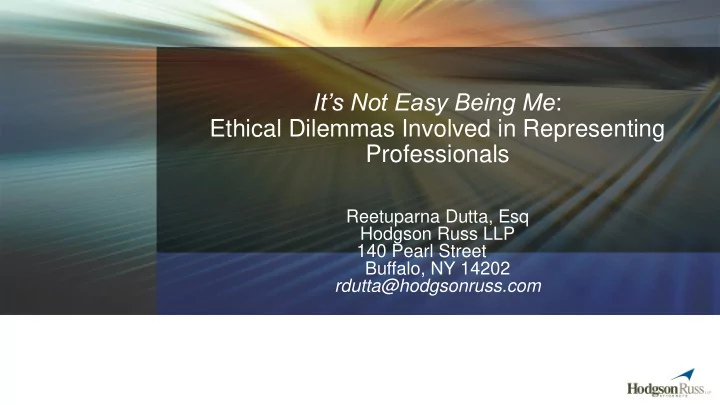

It’s Not Easy Being Me : Ethical Dilemmas Involved in Representing Professionals Reetuparna Dutta, Esq Hodgson Russ LLP 140 Pearl Street Buffalo, NY 14202 rdutta@hodgsonruss.com
Representing Physicians FACT PATTERN: A man dying of AIDS-related complications is admitted into a hospital and falls into a coma. He has never told his family about his disease. His family – including his health care proxy – arrives at the hospital and wants to know what is happening to him. Can the physician disclose his disease?
Representing Physicians Relevant Ethical Rules AMA Principles of Medical Ethics, Principle IV AMA Code of Medical Ethics, Opinion 3.2.1 Relevant Law New York Public Health Law § 2782 Answer: No, unless the information is needed to provide the patient with treatment and such disclosure is in the patient’s best interest.
Representing Physicians FACT PATTERN: A physician wants to prescribe medical marijuana under NYS’s Medical Marijuana program. How do you advise him? And can you advise him?
Representing Physicians Relevant Rules New York Public Health Law § 3360 et seq . Federal Law: 21 U.S.C. § 812 Ethical Rules: NYS Bar Opinion 1024 Answer: Not clear!
Representing Lawyers FACT PATTERN: An attorney who represents a client in litigation is asked to represent the opposing party’s lawyer in another matter. Can the attorney take on this representation?
Representing Lawyers Relevant Rules New York Rules of Professional Conduct, Rule 1.7 NYS Bar Opinion 579 Answer: Yes, but there must be full disclosure to the clients of both lawyers in the litigation and both lawyers must believe that the representation will have no adverse effect on their professional judgment.
Representing a Criminal Defense Attorney FACT PATTERN: A defendant in a murder case walks into his attorney’s office and gives him the murder weapon and tells him to keep it. How should you advise the attorney?
Representing a Criminal Defense Attorney Relevant Rules ABA Model Rule 3.4(a) ABA Criminal Justice Standards for the Defense Function, Standard 4- 4.7 Restatement (Third) Law Governing Lawyers §119 (2000) New York Rules of Professional Conduct, Rule 3.4(a)
Representing a Criminal Defense Attorney What do the courts say? Cannot suppress or conceal physical evidence May have to affirmatively turn over physical evidence But, no affirmative obligation to disclose evidence that is not in an attorney’s possession Answer: The attorney can take temporary possession of the evidence to examine/test it, but must then alert the prosecution.
QUESTIONS?
Recommend
More recommend